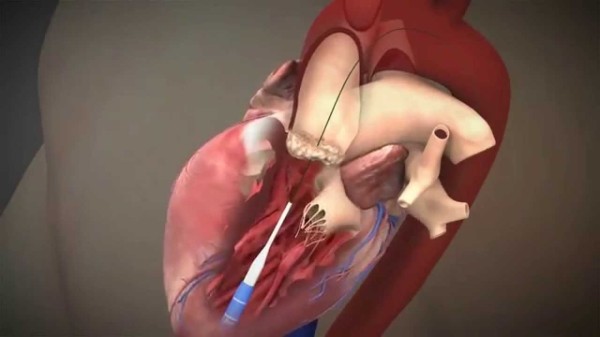
Silver Spring, Maryland–(ENEWSPF)–June 5, 2017. The U.S. Food and Drug Administration today approved an expanded indication for the Sapien 3 Transcatheter Heart Valve (THV) for patients with symptomatic heart disease due to failure of a previously placed bioprosthetic aortic or mitral valve whose risk of death or severe complications from repeat surgery is high or greater.
“For the first time, a regulatory agency is approving a transcatheter heart valve as a valve-in-valve treatment when bioprosthetic mitral or aortic valves fail in patients who are at high or greater risk of complications from repeat surgery,” said Bram Zuckerman, M.D., director of the division of cardiovascular devices at the FDA’s Center for Devices and Radiological Health. “This new approval offers U.S. patients with failing surgical bioprosthetic aortic or mitral valves a less-invasive treatment option.”
A bioprosthetic aortic or mitral valve may fail over time due to stenosis, when the valve narrows and causes the heart to work harder to pump blood, regurgitation, when the valve does not close completely and blood leaks backwards, or a combination of both. Treatment would normally require repeat open heart surgery, which causes a high or greater risk of complications for certain patients.
The FDA originally approved the Sapien 3 THV for transcatheter aortic valve replacement (TAVR) as an alternative option to surgical aortic valve replacement for patients with native aortic stenosis whose risk for death or severe complications from surgery is high or greater. In 2016, the FDA expanded the approved the TAVR indication for Sapien 3 THV to include patients who are at intermediate surgical risk for death or complications. Today, the FDA is the first to approve an expanded use of the Sapien 3 THV as a valve-in-valve treatment. Valve-in-valve procedures offer an alternative to repeat surgery, since the replacement valve is inserted inside the failing surgical bioprosthetic valve through a patient’s blood vessel or a small cut in a patient’s chest.
The FDA evaluated data from the Transcatheter Valve Therapy Registry, a partnership of the American College of Cardiology and the Society of Thoracic Surgeons. The registry collects clinical data on the safety and effectiveness of transcatheter valve replacement procedures performed in a real world setting. The outcome data used to support the marketing application consisted of 314 patients who had undergone aortic valve-in-valve procedures and 311 patients who had undergone mitral valve-in-valve procedures.
The registry data showed that more than 85 percent of patients who underwent aortic or mitral valve-in-valve procedures experienced clinically meaningful improvement in their heart failure symptoms 30 days after the procedure, as shown by their New York Heart Association (NYHA) Classifications. The NYHA Classification is a common classification system by which heart failure symptoms are rated. In both aortic and mitral valve-in-valve patients, the observed mortality rates were substantially lower than the expected mortality rate for repeat surgery.
The Sapien 3 THV should not be used in patients who cannot tolerate medications that thin the blood or prevent blood clots from forming or have an active infection in the heart or elsewhere.
Patients who receive the Sapien 3 THV face potential serious complications from the device or implantation procedure, such as death, stroke, respiratory failure, heart failure, kidney failure and bleeding.
As part of the approval, the manufacturer will participate as a stakeholder of the Society of Thoracic Surgeons/American College of Cardiology Transcatheter Valve Therapy Registry to ensure FDA surveillance for the device over the next five years.
The FDA granted accelerated approval of Sapien 3 THV to Edwards Lifesciences LLC.
The FDA, an agency within the U.S. Department of Health and Human Services, promotes and protects the public health by, among other things, assuring the safety, effectiveness, and security of human and veterinary drugs, vaccines and other biological products for human use, and medical devices. The agency also is responsible for the safety and security of our nation’s food supply, cosmetics, dietary supplements, products that give off electronic radiation, and for regulating tobacco products.
Source: http://fda.gov








